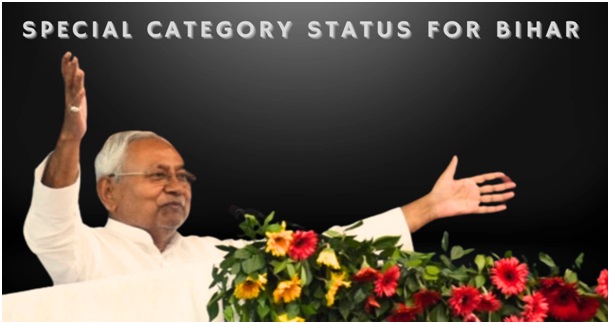Demand for Special Category State Status for Bihar (Indian Express)

- 11 Dec 2023
Why is it in the News?
Bihar Chief Minister Nitish Kumar on Sunday urged Union Home Minister Amit Shah to give Bihar the status of Special Category State, during the meeting of the Eastern Zonal Council (EZC) in Patna.
Context:
- During the 26th meeting of the Eastern Zonal Council on 10th Dec. which was chaired by Home Minister Amit Shah, Bihar Chief Minister Nitish Kumar urged the Home Minister to give Bihar the status of Special Category State.
- He also demanded that the Centre should place two amendment bills raising the quota for deprived castes from 50 to 65% in state government jobs and educational institutions in the 9th Schedule of the Constitution to make them to make them immune to legal scrutiny.
- The Ninth Schedule of the Constitution includes a list of Central and state laws that cannot be challenged in courts.
- In 1992, the Supreme Court capped reservations for the backward classes at 50 per cent.
- Regarding Caste Based Survey, he said the Central government never had any intention of creating hurdles in the caste-based survey.
What is a Special Category Status (SCS)?
- It is a classification granted by the Centre to assist the development of States that face geographical or socio-economic disadvantages.
- The SCS was introduced in 1969 on the recommendation of the Fifth Finance Commission (FC).
- Five factors such as:
- (i) hilly and difficult terrain
- (ii) low population density and/or sizeable share of tribal population
- (iii) strategic location along international borders
- (iv) economic and infrastructural backwardness and
- (v) non-viable nature of state finances, are considered before granting SCS.
- In 1969, three States — Jammu & Kashmir, Assam and Nagaland — were granted the SCS.
- Subsequently, eight more States including Arunachal Pradesh, Manipur, Meghalaya, Mizoram, Sikkim, Tripura, Himachal Pradesh, and Uttarakhand were given the SCS by the erstwhile National Development Council.
What are the Benefits of Special Status?
- The SCS States used to receive grants based on the Gadgil-Mukherjee formula, which earmarked nearly 30% of the total central assistance for States to the SCS States.
- However, after the abolition of the Planning Commission and the recommendations of the 14th and 15th FC, this assistance to SCS States has been subsumed in an increased devolution of the divisible pool funds for all States (increased to 41% in the 15th FC from 32%).
- Additionally, in the SCS States, the Centre-State funding of centrally sponsored schemes is divided in the ratio of 90:10, far more favourable than the 60:40 or 80:20 splits for the general category States.
- Besides, there are several other incentives available to the SCS States in the form of concession in customs and excise duties, income tax rates and corporate tax rates to attract investments to set up new industries etc.
Why is Bihar demanding the Special Category Status (SCS)?
- The demand for SCS for Bihar has been made by various political parties of the State time and again.
- The poverty and backwardness of the State are argued to be because of the lack of natural resources, continuous supply of water for irrigation, regular floods in the northern region and severe droughts in the southern part of the State.
- Simultaneously, the bifurcation of the State led to the shifting of industries to Jharkhand and created a dearth of employment and investment opportunities.
- With a per-capita GDP of around ?54,000, Bihar has consistently been one of the poorest States.
Is Bihar’s demand justified?
- Although Bihar meets most of the criteria for the grant of SCS, it does not fulfil the requirement of hilly terrain and geographically difficult areas, which is considered to be the primary reason for difficulty in infrastructural development.
- In 2013, the Raghuram Rajan Committee set up by the Centre, placed Bihar in the “least developed category” and suggested a new methodology based on a ‘multi-dimensional index’ for devolving funds instead of an SCS, which can be revisited to address the State’s socio-economic backwardness.
Do other States also want Special Category Status (SCS)?
- Since its bifurcation in 2014, Andhra Pradesh has asked for a grant of SCS on the grounds of revenue loss due to Hyderabad going to Telangana.
- Additionally, Odisha has also been requesting for the SCS, highlighting its vulnerability to natural calamities such as cyclones and a large tribal population (nearly 22%).
- However, the Central government citing the 14th FC report, which made a recommendation to the Centre that no State be accorded the SCS, has repeatedly denied their demands.
What are the Challenges Associated with Special Category Status (SCS)?
- Resource Allocation: The provision of Special Category Status (SCS) involves extending additional financial aid to the state, potentially straining the central government's resources.
- Balancing fund allocation among states becomes crucial, raising concerns about disparities or dissatisfaction among non-SCS states.
- Dependency on Central Assistance: States awarded SCS often develop a heavy reliance on central assistance, potentially discouraging efforts toward self-sufficiency and independent economic growth.
- Implementation Challenges: Even after receiving SCS, challenges may arise in effectively utilizing funds due to administrative inefficiencies, corruption, or inadequate planning. Ensuring the allocated funds serve their intended purposes remains a significant hurdle.
The Way Forward:
There is a necessity to review and refine the criteria for granting SCS to ensure fairness and transparency. Clearly defining eligibility parameters based on socio-economic indicators, infrastructure development, and other relevant factors is crucial.
Encourage states to formulate comprehensive development plans focused on sustainable growth, job creation, infrastructure development, and human capital enhancement. SCS should be part of a broader strategy for holistic development.
Implement policies that gradually reduce states' dependence on central assistance, promoting self-sufficiency and economic diversification. States should be encouraged to generate their revenue streams.
